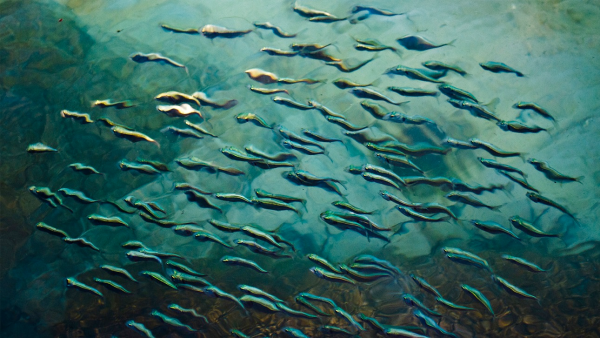A Big Win for a Small Fish
 |
Never heard of Atlantic menhaden? If so, you’re not alone: The small fish doesn’t grab headlines the way that more charismatic marine life such as striped bass, humpback whales, or dolphins do. But menhaden are critical to the survival of all of these predators and then some, including birds such as osprey and eagles. Throughout their traditional East Coast habitat from Nova Scotia to Florida, menhaden are an integral piece of the food web—sustaining so many species that they’re often referred to as “the most important fish in the sea.”
Menhaden are also caught for use in the manufacture of feed for fish farms, pets, and livestock; to provide oil for the creation of nutritional supplements and cosmetics; and for use as bait by fishermen. That all contributes to making them the largest East Coast fishery by weight, with a catch that registers over 400 million pounds a year. In fact, menhaden have had a major impact on the economy and ecology of our Atlantic coast for centuries.
So when menhaden numbers shrink, animals that depend on them for survival suffer. Yet until 2013, there was no coastwide catch limit on menhaden. Although recent management measures to conserve the species have helped the population to increase, today it remains much smaller than its historic size, and the fish is no longer abundant throughout its full geographic range.
The good news is that recognition of menhaden’s importance and of how to best protect them has been growing. Scientists have long recommended that fishery management—even for a single species—should rely on ecosystem-based science, an approach that takes the broader marine food web into consideration when setting catch limits. The Pew Charitable Trusts has advocated for nearly a decade to secure ecosystem-based management for menhaden from the Atlantic States Marine Fisheries Commission (ASMFC), the body that regulates menhaden fishing.
To implement ecosystem-based fishery management for forage fish such as menhaden, research shows that guideposts known as ecological reference points (ERPs) should be used when setting catch limits. ERPs use a computer model to factor in the specific sustenance needs of predators and protect the larger food web. Pew was among more than 80 national, regional, state, and local groups and businesses urging the ASMFC to modernize management of menhaden through the addition of ERPs. And in August, after years of consideration, including a review of hundreds of thousands of public comments, the ASMFC committed to using ERPs to guide how it sets catch limits—a giant win for ecosystem-based science and menhaden, and one that sets a new precedent for using modern advancements in global fisheries science and modeling.
The model chosen by the ASMFC was developed by Tom Miller, a professor of fisheries science at the University of Maryland and director of the university’s Chesapeake Biological Laboratory, and Andre Buchheister, who teaches fish conservation and management at Humboldt State University in California. Their research was supported by the Lenfest Ocean Program, established in 2004 by the Lenfest Foundation and managed by Pew.
“The researchers we funded worked with fishery managers for years to develop the model to ensure it generated specific, practical advice on sustainably managing menhaden and their predators,” says Lenfest director Charlotte Hudson. “It is gratifying to see its real-world application.”
“When enough menhaden are left in the ocean, their predators are healthier and more abundant,” says Joseph Gordon, who directs Pew’s conserving marine life in the United States project. “Communities along the entire coast benefit as the value of recreational fishing, seafood, and tourism businesses that depend on these species increases. Now, by setting catch limits that account for menhaden’s full ecological role, the Atlantic States Marine Fisheries Commission has significantly advanced our country’s commitment to the modern, science-based management of fisheries.”
—Demetra Aposporos, Pew Foundation


 Advertising
Advertising